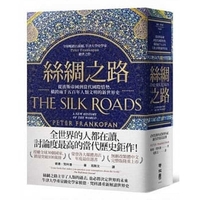Take a photo of a barcode or cover
This history refreshed my memory of some of the major events leading to the modern era. Who controls the precious resources of the age are the civilizations that control the world. The Middle East and the Caucasus region are frequently at the heart of the action.
I think it was a good book that helped me understand more about what the neuralgic center of the world were (and maybe will be?). The story is quite interesting and well written, but the last chapters regarding the second half of the XIX century onwards, the details and nitty-gritty overcome the main narrative, making it kind of dull and hard to read (honestly I skipped the last chapters).
It still feels a super euro-centric book, where everything is about what europe is going to become: There is little description of China for example, and Africa and the Americas (especially South America) are mentioned barely as a source of goods (how you would talk about your cabinet with baking goods[*]). Even the comments about Asia feels in many passages as things that happen _regarding_ europe, so it's kind of a bummer.
Regardless of all that, I think it is an interesting book that helps to have a perspective of how the world has developed based on commerce.
[*] The US may have been mentioned in the final chapters a lot, but I skipped them because they were kind of boring.
It still feels a super euro-centric book, where everything is about what europe is going to become: There is little description of China for example, and Africa and the Americas (especially South America) are mentioned barely as a source of goods (how you would talk about your cabinet with baking goods[*]). Even the comments about Asia feels in many passages as things that happen _regarding_ europe, so it's kind of a bummer.
Regardless of all that, I think it is an interesting book that helps to have a perspective of how the world has developed based on commerce.
[*] The US may have been mentioned in the final chapters a lot, but I skipped them because they were kind of boring.
informative
reflective
slow-paced
Very well written and clearly very well researched. An illuminating read that had me learning new things almost every chapter. Incredibly ambitious in its scope, and excellent in its execution. Thoroughly recommended to anyone with a passing interest in understanding how the world works.
emotional
informative
medium-paced
I found the first half incredibly interesting but the rest hard to follow, it felt like it was full of small details that distracted me from the big picture. Still interesting to read or, as I prefer in the case of big books, listen as audiobook.
Among the most interesting and insightful books I have read. Although I haven’t finished it (it is rather a heavy read), this fresh approach to looking at the history of the world is an eye opening, thought provoking read
Essentially, the book is an attempt at a “re-do” on world history for people who learned it in the typical way in the “west.” What do I mean? Even I, as a student of history, largely learned my history as if civilization started in the West (well Greece and Rome). This book puts paid to that idea. The Middle East and Far East were advanced and sophisticated civilizations while the West - particularly Europe was shrouded in darkness.
In fact, much of how the West learned to be “civilized” came from imitation of how things were done in the middle and Far East. How did they learn these things? From their traders returning from the Silk Road trade routes. These advanced civilization brought us many of the best aspects of our history and moved us away from many of our boat barbaric acts.
I can smell a “politically correct” book a mile away, and this is NOT such a book. This is to books what a “market correction” is to stocks. It is a necessary read for those who want to be fully informed about our foundations. Oh, and a handful of things about the barbarity of the Portuguese, Spanish, Danes, English, and Dutch will blow your mind!!
Essentially, the book is an attempt at a “re-do” on world history for people who learned it in the typical way in the “west.” What do I mean? Even I, as a student of history, largely learned my history as if civilization started in the West (well Greece and Rome). This book puts paid to that idea. The Middle East and Far East were advanced and sophisticated civilizations while the West - particularly Europe was shrouded in darkness.
In fact, much of how the West learned to be “civilized” came from imitation of how things were done in the middle and Far East. How did they learn these things? From their traders returning from the Silk Road trade routes. These advanced civilization brought us many of the best aspects of our history and moved us away from many of our boat barbaric acts.
I can smell a “politically correct” book a mile away, and this is NOT such a book. This is to books what a “market correction” is to stocks. It is a necessary read for those who want to be fully informed about our foundations. Oh, and a handful of things about the barbarity of the Portuguese, Spanish, Danes, English, and Dutch will blow your mind!!
Once you realize it, you can't unsee it. It's an impressive history book, clearly well researched, detailed to the extreme and rather entertaining. But it mentions around 3 notable female historical figures and women in general only feature when Frankopan discusses slavery or wartime rape. As if half the population of the world was not really around for the 2000 years or so he focuses on, unless of course when it comes to suffering war crimes. It's quite annoying after a while.
I enjoyed this well-researched book but it wasn't what I expected. The first part of the book was a sprawling survey of the silk road proper, followed by commentary on colonial trade routes. The last part if the book discusses the world wars, decline of the British Empire and, finally, the disasterous British and US relationships in the Middle East over oil. I learned so much and Frankopan filled historical gaps about the Mongols and other aspects of history in the region, but like other reviewers I found it eurocentric, if sympathetic. It's a good survey and there is no doubt his voluminous footnotes, which take up half the book, will augment any further research you want to conduct.
For anyone who is a fan of history, particularly ancient history and European history, this is a must read!




